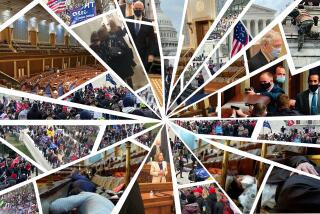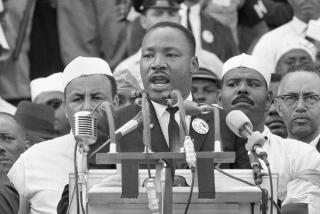Mike Gerson
- Share via
With President Bush in Florida, Mike Gerson, 38, director of presidential speech-writing, was working at home on Sept. 11 when a colleague in the office called with the news of the World Trade Center.
*
“He said, ‘You’d better come in.’ I got on Interstate 395 and saw the plane come in. I didn’t see the actual impact, but 395 curves around the Pentagon, and I saw that plane coming in and said to myself, ‘That plane is too low; it’s going to crash.’ I made no connection in my mind to the World Trade Center and heard nothing, but I saw the smoke come up.
I was there for two hours. In my car, I started to write some thoughts about what the president might say that night, and I sent them off to [presidential advisor] Karen Hughes, who eventually organized the whole thing.
And finally they turned us back around going the wrong way on 395. And I went home. I finally got in touch with my wife, who had picked up my son from day care. And there was literally no way for me to get in to the White House. [Highway] 395 was closed; the Metro was shut.
The next day, I got in as early as I could. I normally drive right past the Pentagon. One of the most memorable experiences I had was the smell of the Pentagon burning, that acrid smell. And I got a very strange feeling, that symbol of American power burning.
I believe it was the next day--it all blurs together--that the president immediately said we need to have a national memorial service. So I went in to talk to him initially about that speech. He looked at me when I came in--and I know now he said this to other people--but it was still amazing, he said, ‘Mike, we’re at war.’ And he had a real sense of that from very early in the process. And that’s a sobering experience; I’m not sure I ever thought I would hear that.
We talked about that speech, the National Cathedral speech, and what he wanted to accomplish. I had just one day to write it.
Watching him stand in the rubble with the megaphone in New York later that day really reinforced to me that presidential leadership is more than speech-making. It’s a sense of moment. That day was a turning point in the history of our presidency, and to some extent the country.
In the White House now, the biggest difference is a difference in atmosphere. You know you are involved in an unfolding series of events that are important in the history of the country. In the normal period, before Sept. 11, it was hard to have that total story line in mind. There was always something new, some different challenge, some different piece.
Even though we still have a lot of day-to-day stuff at the White House, you know you are in an unfolding story.”
*
As told to Ronald Brownstein
More to Read
Get the L.A. Times Politics newsletter
Deeply reported insights into legislation, politics and policy from Sacramento, Washington and beyond. In your inbox twice per week.
You may occasionally receive promotional content from the Los Angeles Times.








